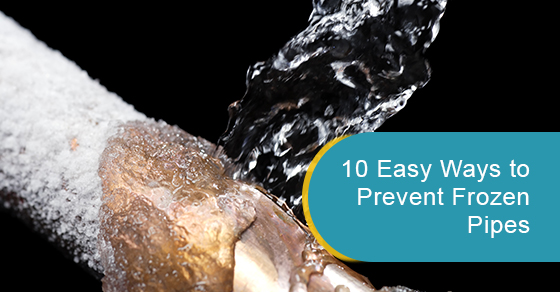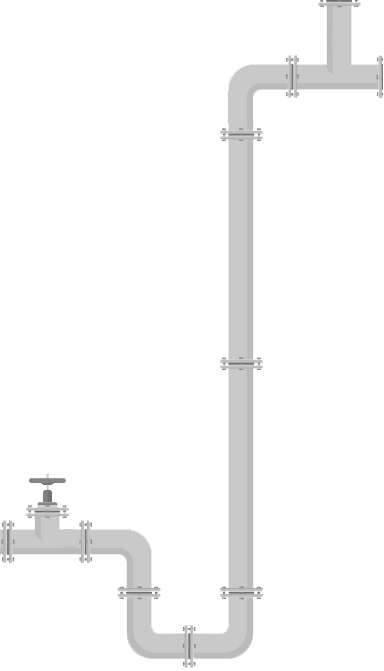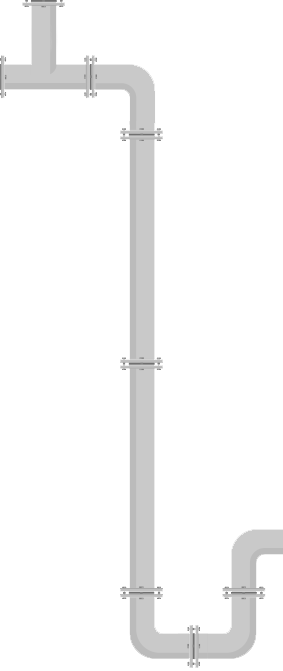10 Easy Ways to Prevent Frozen Pipes
Posted by Jason Genah on 06-12-2021

In this article, we will discuss 10 tips to prevent your pipes from freezing.
1. Ensure pipes are insulated
You can avoid freezing pipes by purchasing pipe insulation designed for this purpose. In comparison to the costs of repairing a ruptured pipe, pipe insulation is often remarkably cost-effective. Insulate pipes in unheated spaces of your home, such as your attic, garage, and basement, especially when it comes to your water system.
Fiberglass, polyethylene, and foam are the most common materials used to insulate pipes. The temporary solution for emergency insulation during the cold weather can be made with duct tape and rolled-up newspaper.
2. Make sure the garage doors are closed
Keeping your garage doors closed will help keep your pipes from freezing. Garages usually contain high levels of smooth concrete, making them particularly cold. If water supply lines go through the garage, this is especially important. The space is cold enough without letting in additional freezing air, which would subsequently drop the garage’s overall temperature. The water supply lines in your garage could freeze if your garage door is accidentally left open, which is a disaster waiting to happen.
3. Leave cabinets open
To keep the plumbing warm, open your bathroom and kitchen cabinets periodically. Having heated air prevents ice blockages, which can lead to pressure buildup in the pipes. If the weather forecast is for an extremely cold night, it is a good idea to open your cupboards before you go to bed so that the pipes stay clear and they get some warmth from the room. If you have small children or curious pets, be sure to remove any cleaning products with toxic chemicals.
4. Allow faucets to drip
You can prevent the freezing of pipes by keeping the faucet running. Turning on every tap in your house is not necessary. You should first identify which ones are fed by exposed piping. When the weather gets especially cold, keep these few faucets on. Standing water has more internal energy than running water, even a small trickle.
A small amount of heat is produced by moving water due to friction caused by its constant movement, so it’s harder for running water to freeze. You can stop ice blockages in your plumbing by allowing a few faucets in your home to keep running.
Running water relieves pressure buildup in cold pipes even more than friction and heat produced by moving water. Even if the water inside the pipes freezes, this will help to prevent the pipes from bursting. Both cold and hot water lines should be slightly running (if both are exposed) to avoid pressure building up in one and not the other.
5. Maintain a consistent thermostat
Maintaining a constant temperature both during the day and at night is one way to prevent ice blockages. Even though many homeowners lower their thermostats at night in order to reduce their heating bills, that strategy may backfire—burst pipes are far more expensive than an extra few dollars of energy for heating.
Keep the temperature of your home as constant as possible during the day and at night. You should avoid sudden changes in the environment of your home in order to prevent your pipes from icing up.
6. Repair and seal cracks and openings
Be sure to check your home for any holes, cracks, or openings before winter so that any drafts won’t cause your water systems to freeze. Examine any cracks that may exist around windows and doors, as well as any holes in your walls or floors where cable wires are connected, such as those for televisions, Wi-Fi, or cables.
Seal any holes around the sill plates where your house rests on its foundation. On both interior and exterior walls, caulk cracks and holes around the piping. This will not only prevent ice from building up inside your home, but it will also improve its insulation.
7. Be sure to leave the heat on
You should turn on your heat while you’re away from your home during the winter, especially if you plan to be gone for a long period of time. The thought of turning on your heat when the house is vacant may seem counterintuitive. Lower home temperatures may reduce your heating bills, but if cold temperatures hit, your pipes can freeze and burst. In order to keep your pipes safe, however, you need not keep your house too warm; temperatures between 13 and 18 degrees Celsius are appropriate.
8. Let the interior doors stay open
All of your interior doors should be left open if you want to maintain a consistent temperature in your home. The pipes in your home are mostly found in the bathroom and kitchen cabinets, often in the center of your house. Nevertheless, even these pipes are susceptible to freezing, and to some extent, most houses suffer from uneven distribution of heat. Open interior doors to ensure that heat is distributed evenly and consistently throughout your home. This is a useful strategy during cold spells, as it encourages the circulation of warm air between rooms.
9. Crawl spaces must be sealed
Your home’s ventilated crawl spaces may need to be temporarily covered if your winter looks particularly bitter. Crawl space insulation can reduce the amount of cold air that surrounds your pipes. You can seal your crawl space by using foam pieces that are cut to the dimensions of the vents. With duct tape, you can keep them in place, and you’ll have an inexpensive and easy way to keep warm this winter.
10. Use heating tape
Electrical heating tape can be applied directly to piping that is easily accessible to help it retain heat. This is especially important when it comes to pipes in unheated or outdoor spaces, including attics and basements. Depending on your needs, you can use either self-monitoring or manual heating tape.
A sensor on the first type of heating tape detects when it is necessary to heat the pipe more and automatically turns it on or off. You need to plug in the manual type of heating tape whenever you need heat, and unplug it after the pipe has warmed. It can be dangerous to use electrical heating tape, however, as with any heating system. When applying it to your pipe systems, therefore, be sure to follow the manufacturer’s instructions.
Regardless of how well your pipes are prepared for winter, a harsh cold snap can cause your pipes to freeze and burst. Despite your best efforts, it’s more often than not that a ruptured water system results in serious and expensive damage.
Contact Drain King Plumbers immediately if you experience serious plumbing problems or need help with frozen pipe repair in Toronto. The sooner you call, the better the chance we can resolve the problem before extensive damage occurs.
For more information about plumbing problems, call Drain King Plumbers at 833-983-5663 or click here to contact us.




